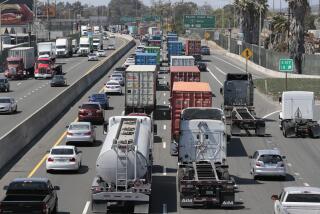Arco Discloses Development of Decisively Cleaner Diesel Fuel
- Share via
Scientists at Atlantic Richfield Co. have developed a new experimental diesel fuel that the Los Angeles oil company said could make “dramatic reductions” in air pollutants from buses, trucks and cars.
In preliminary testing, the fuel, called EC Diesel, resulted in a 15% reduction in particulates and a 5% reduction in nitrogen oxide emissions, both key components in smog, without reducing fuel economy, Arco will announce today.
“Reductions of those kind are hard to get. If it were to become widely used, it could become very significant,” said Tom Eichhorn, spokesman for the South Coast Air Quality Management District.
Arco plans to test EC Diesel in nearly 200 Southern California fleet vehicles, such as buses and trucks, to verify the results and hopes to make the fuel commercially available in a few years.
“We’re pretty excited about the possibilities of EC Diesel,” said Roger Truitt, president of Arco Products, the firm’s refining and marketing arm. “From the chairman on down, there is a commitment at Arco to clean fuels.”
In California alone, diesel fuel powers several hundred thousand trucks, plus many buses, tractors, bulldozers and other heavy vehicles. An estimated 740,000 diesel-powered vehicles will travel California’s roads by next year.
Breathing the particulates found in diesel exhaust is considered a major threat to the public, and the Environmental Protection Agency recently set stringent new health standards for cities that could force a cleanup of diesels. Also, last year, the Air Resources Board declared diesel particulates a cancer-causing substance.
Large trucks represent only 2% of California’s vehicles but account for about 30% of nitrogen oxides and 65% of particulates pumped by vehicles into the air, the ARB says.
Air-quality watchers reacted with restrained enthusiasm, both praising Arco’s push for cleaner fuels but noting the experimental nature of the project.
“We are pleased Arco is undertaking this project and look forward to examining how improvements in diesel fuel could be a tool in helping California reduce exposure to diesel particles and help achieve compliance with other air quality standards,” said Mike Kenny, executive director of California Air Resources Board.
Eichhorn said EC Diesel’s potential will not be known until testing is completed.
“Clearly, Arco has a vested interest in maintaining market share, and we love the way that competition leads to the development of cleaner fuels,” he said.
Truitt estimates that Arco will spend nearly $2 million on developing and testing EC Diesel, which was created during the last year at Arco’s research facility in Anaheim.
The new Arco fuel is much lower in sulfur and aromatics than current diesel, although the specifics are “classified information,” an Arco Products spokesman said.
Reducing sulfur in the fuel is widely considered critical to cleaning up the exhaust. Energy officials predict that the ingredients of diesel fuel will change dramatically over the next 10 years.
The Big Three auto makers have added a major incentive to clean up diesel exhaust: They hope to soon begin manufacturing sport-utility vehicles powered by diesel. Nearly 20% of all new vehicles sold in the country are SUVs, so it would open up a huge new market for companies such as Arco that make diesel fuel.
Under new California standards, SUVs can be powered by diesel fuel only if they are as low in emissions as gasoline-powered cars. Existing diesel fuels are dirtier but more fuel-efficient than gasoline.
Arco’s Truitt said the new fuel will cost about 10 cents to 15 cents more to produce in the relatively small 7-million gallon batch to be used during the yearlong test, expected to start at the end of summer. If the fuel is produced commercially, that premium probably would be smaller, he said.
The cost of the new fuel would be a factor in its market acceptance. Even a penny-a-gallon increase can make a trucking firm unprofitable.
A cleaner-burning diesel fuel is a step in the right direction, said Todd Campbell, policy director for the Coalition for Clean Air in West Los Angeles, an environmental group.
“But we’re always cautious about trying to make diesel work . . . because it distracts us from our ultimate goal, which is to move toward clean technologies that are not petroleum based,” Campbell said, such as fuel cells and natural gas.
More to Read
Sign up for Essential California
The most important California stories and recommendations in your inbox every morning.
You may occasionally receive promotional content from the Los Angeles Times.













